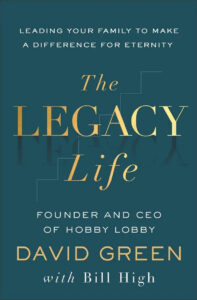How to Live So You Leave a Legacy For Generations to Come

Family Worldview Today
Today, most families would see themselves as a nest. As long as our children are in the nest, we’ll feed them, protect them, and try to do the right things for them. We’ll do all that we can to make sure they get the best food, the best clothes, the best education. We’ll go the extra mile for them to make sure they get the best experiences—sports teams, music lessons, vacations, academic tutoring, and so on.
We’ll wait anxiously to see if they made the top teams. And we’ll pile on experience after experience, trying to make sure they don’t miss out. With all this focus on children, it can seem we are family-focused. But we’re not. Kids are at the center of the world—not the family.
This childcentered parenting has the impact of teaching kids that the world is about them. The accomplishments of the individual are more important than the accomplishments of the family, the community, and the church.
The Goal of the Family
Because of this attention on the individual, our perspective of kids is that they are expensive. If we are going to fund all their needs, including college, then those bills will add up. As a result, we shouldn’t have too many. In this environment, siblings are often competing for resources—the attention of parents, the allocation of resources to “their” activities.
And marriage? In Western culture, the wife usually leads the family, and the husband focuses on his career. He is involved in the family but draws his main identity from work. Pryor writes, “Today a man could have an amazing career, leave his family in ruins and still be considered a truly great man.” He works hard in business and then is expected to love his family as an afterthought to building a great career.
But in the biblical model, the wife leads in partnership with her husband. And the father is the one burdened with the primary responsibility: “Fathers, do not exasperate your children; instead, bring them up in the training and instruction of the Lord” (Eph. 6:4).
In the biblical model, before life became so separated, kids worked alongside parents as a team, and spouses worked together as a team, with the primary responsibility of raising children falling on the husband.
A Family Mission
What’s the goal of this nest for family? It’s an empty nest. We’ll do all we can to prepare our children for life outside the nest. In fact, many jest today that they’ve “got the kids off the payroll.” Now, don’t misunderstand, I’m not suggesting that our adult children are still supposed to be living in our basements. That’s a failure to launch.
What I am saying is there was a time when our families lived under a mission and mandate together—to make the world a more beautiful and creative place in the character and image of God.
For parents, when we get to the empty-nest stage of life, we can pursue our own goals. For moms, it may be that they go back to work, go back to school, or pursue that long-awaited hobby. For dads, it may mean retirement, travel, more golf—or pickleball! These other pursuits, by nature, mean that the parents become unavailable except for occasional grandparenting duty.
The problem with this emptynest worldview is that it promotes and encourages a hyperindividualistic culture at every level. For the kids. For the parents. For the grandparents. We don’t stand for anything as a family other than our own individual interests. We break into a thousand little pieces.
Where Do We Go from Here?
As a culture, our families are neckdeep in hyper-individualism. But what would culture look like if family and community came first? What if “we” came before “me”?
We would choose to stay interdependent by necessity.
On a spiritual level, we need each other. Paul writes in Ephesians, “From [Jesus] the whole body, joined and held together by every supporting ligament, grows and builds itself up in love, as each part does its work” (4:16). We grow and build each other up. Each part plays a role.
Are you caught up in trying to build a life you love? Jesus warns us, “Unless a kernel of wheat falls to the ground and dies, it remains only a single seed. But if it dies, it produces many seeds” (John 12:24).
The beauty of an individual seed that dies to itself is that it bears much fruit.
Reflection:
Are you living in a way that will leave a legacy for your children, grandchildren, and even their children? Do you feel you’ve fallen into the trap of living for yourself without centering your family after your kids move out? Think about how you can build a legacy for them starting today.
If you enjoyed today’s post, check out the book The Legacy Life by David Green and Bill High. Rejecting the current work-hard-then-retire mindset, David Green, founder and CEO of Hobby Lobby, and Bill High call us to a biblical view of ourselves and our families–a generational mindset. With a paradigm-changing perspective, this book helps you develop a legacy perspective on your life and family.

David Green is the founder and CEO of Hobby Lobby, which employs 50,000 people at 1,000 stores in 48 states and grosses nearly $8 billion a year. Author of Leadership Not by the Book and The Leader’s Devotional, Green received the World Changer award and the Ernst & Young Entrepreneur of the Year Award. David, his wife, Barbara, and their children, grandchildren, and great-grandchildren all live in Oklahoma City.

100 Words of Affirmation Your Son/Daughter Needs to Hear
Matt and Lisa Jacobson want you to discover the powerful ways you can build your children up in love with the beautiful words you choose to say every day–words that every son and daughter needs to hear.
These affirmation books offer you one hundred phrases to say to your son or daughter – along with short, personal stories and examples – that deeply encourage, affirm, and inspire.
So start speaking a kind and beautiful word into their lives daily and watch your children–and your relationship with them–transform before your eyes.







